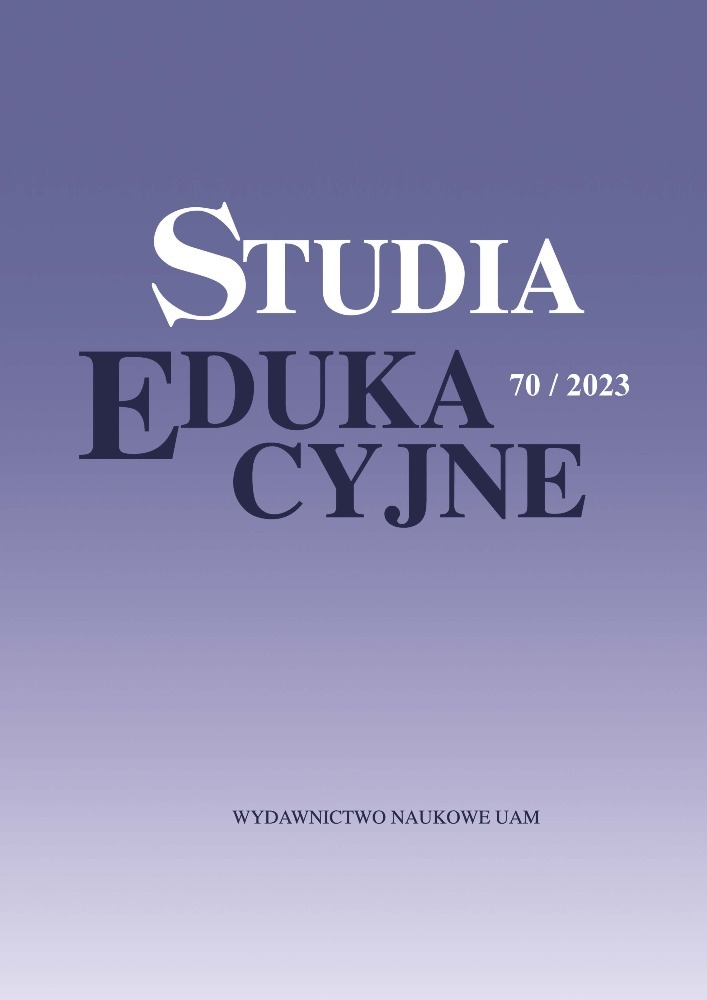Abstrakt
The article brings an answer to the question of which situations students perceive as difficult and which coping strategies they rely on. The study, consisting of two surveys, was carried out in the school year 2021/2022 and was conducted in 22 classes in the sixth and seventh years. Teams were drawn from all such classes in state primary schools in one lager city. The questionnaire How Do You Cope by Zygfryd Juczyński and Nina Ogińska-Bulik was used for the diagnosis. Analysis of the results shows that girls and boys differ in their perception of difficult situations. In the girls’ group, both in the first and second survey, problems in relations with peers were indicated most frequently, and those concerning family relations were mentioned somewhat less frequently. Boys, however, most frequently indicated that difficult situations are those that concerned school. The second most frequently mentioned ones were difficulties in relationships with peers. Irrespective of the type of situation indicated by the respondents as difficult, the strategy consisting in seeking support was used least frequently and a focus on emotions was used most frequently.
Bibliografia
Heszen-Niejodek, I. (2007). Teoria stresu psychologicznego i radzenia sobie. W: J. Strelau (red.), Psychologia. Podręcznik akademicki. Jednostka w społeczeństwie i elementy psychologii stosowanej (ss. 465-492). Gdańsk: Gdańskie Wydawnictwo Psychologiczne
Juczyński, Z., Ogińska-Bulik, N. (2012). Narzędzia Pomiaru Stresu i Radzenia Sobie ze Stresem. Podręcznik. Warszawa: Pracownia Testów Psychologicznych Polskiego Towarzystwa Psychologicznego
Krejtz, K., Krejtz, I. (2005). Metoda analizy treści – teoria i praktyka badawcza. W: K. Stemplewska-Żakowicz, K. Krejtz (red.), Wywiad psychologiczny. Wywiad jako postępowanie badawcze (ss. 129-148). Warszawa: Pracownia Testów Psychologicznych Polskiego Towarzystwa Psychologicznego
Misiuk, A. (2015). Zajęcia prowadzone w oparciu o program profilaktyczno-wychowawczy: Spójrz inaczej jako sposób wspomagania rozwoju psychospołecznego dzieci. W: J. Aksman, A. Douskova, J. Gabzdyl (red.), Kompetencje, kształcenie, ewaluacja. W poszukiwaniu innowacyjnego modelu kształcenia i oceny kompetencji uczniów młodszych (ss. 81-90). Kraków: Oficyna Wydawnicza AFM
Ogińska-Bulik, N., Juczyński, Z. (2008). Osobowość, stres a zdrowie, Warszawa: Wydawnictwo Difin
Rubacha, K. (2008). Metodologia badań nad edukacją, Warszawa: Wydawnictwa Akademickie i Profesjonalne
Tyszkowa, M. (1972). Zachowanie się dzieci szkolnych w sytuacjach trudnych. Warszawa: Państwowe Wydawnictwo Naukowe
Licencja
Prawa autorskie (c) 2023 Misiuk Agnieszka, Deptuła Maria

Utwór dostępny jest na licencji Creative Commons Uznanie autorstwa 4.0 Międzynarodowe.

